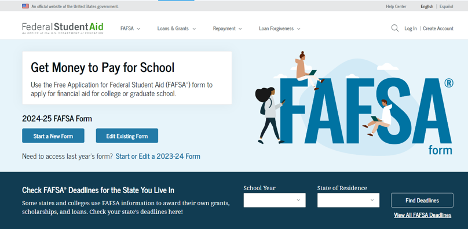The Education Department has released a draft of the new Free Application for Federal Student Aid (FAFSA) which is set to launch later this year. The new version has 46 questions and runs 21 pages, which is longer than many had hoped, but it will be easier to complete online. Most of the financial questions will be answered automatically once users authorize the secure transfer of their tax return information. The FAFSA Simplification Act requires institutions to be more precise with on-campus housing costs, but the new FAFSA won’t ask about students’ housing plans. The National Association of Student Financial Aid Administrators is concerned that this could lead to inaccurate aid offers. Several of the comments already posted on the form urge the department to add the question back. The new FAFSA will be easier to complete for students experiencing homelessness or not in contact with their parents. Students whose families have an adjusted gross income of less than $60,000 won’t have to answer questions about assets.
New Draft FAFSA Unveiled
The Education Department has released a draft of the new version of the Free Application for Federal Student Aid (FAFSA) that will launch later this year. The current draft has 46 questions and runs 21 pages, but many students may not have to answer all the questions. This is the first glimpse of what the new FAFSA will look like after the overhaul.
Although the new version is longer than many had hoped, a combination of technology and legislative changes should make the process of filling out the application simpler. The online experience is where the simplicity lies because the data can be retrieved directly from the IRS, and all the skip logic is built in.
According to Jill Desjean, a senior policy analyst with the National Association of Student Financial Aid Administrators, “A paper form was never going to be simpler.” She added that the new FAFSA draft has been reorganized to look less like a tax form and is less intimidating.
The Education Department has made the draft available for public comment until May 23 before finalizing the document. The draft materials currently include only the paper application, although most students use the online portal to apply for aid.
The new application won’t be available to students until December because of the work required to update the form. The department has been working to overhaul the form and the underlying system for distributing billions in federal financial aid since Congress passed the FAFSA Simplification Act in 2020. That law opened up the Pell Grant to incarcerated students and simplified the criteria for Pell Grant eligibility, among other changes. The draft materials include a similar FAFSA for incarcerated students.
New FAFSA to be Easier for Students
The Education Department recently released a draft of the new Free Application for Federal Student Aid (FAFSA), which is set to launch later this year. The draft reveals that the new version will have 46 questions and run 21 pages, which is longer than many people had hoped. However, the good news is that students applying online won’t have to answer all those questions. Most of the financial questions will be answered automatically once users authorize the secure transfer of their tax return information. The federal FUTURE Act makes this possible by allowing the department to automatically import federal tax information from the Internal Revenue Service into the FAFSA if the user consents.
According to Bryce McKibben, senior director of policy and advocacy at the Hope Center for College, Community, and Justice at Temple University, the new form will be easier to complete for students from a wide range of family circumstances. “Lower-income students are going to be providing basically just consent and demographic information,” said Jill Desjean, a senior policy analyst with the National Association of Student Financial Aid Administrators. “Everything else is just done for you or you get to skip it and then you’re finished with it. So I think it could be a really easy experience.”
The FAFSA Simplification Act also requires institutions to be more precise with on-campus housing costs. However, the act doesn’t allow the department to add certain questions to the form. For example, the new FAFSA won’t ask about students’ housing plans. The National Association of Student Financial Aid Administrators is concerned that this could lead to inaccurate aid offers. Several of the comments already posted on the form urge the department to add the question back.
The new FAFSA will be easier to complete for students experiencing homelessness or not in contact with their parents. According to McKibben, “students experiencing homelessness or not in contact with their parents will have a FAFSA they can actually complete.” Moreover, students whose families have an adjusted gross income of less than $60,000 won’t have to answer questions about assets.
NASFAA Urges Education Department to Add Housing Question Back to FAFSA
The National Association of Student Financial Aid Administrators (NASFAA) is concerned that the Education Department’s decision to remove the housing choice question from the Free Application for Federal Student Aid (FAFSA) could mean students receive inaccurate aid offers. Currently, colleges and universities use a single estimate for housing costs regardless of whether the student plans to live on or off campus. The FAFSA Simplification Act requires institutions to be more precise with on-campus housing costs. Jill Desjean, a senior policy analyst with NASFAA, said that administrators will eventually know where a student is living, but the accurate information may come too late. She believes adding the question back makes more sense.
Don’t miss interesting posts on Famousbio









